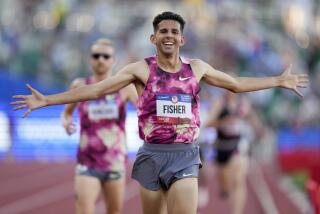Running / Julie Cart : Boston Marathon: Wallet-Break Hill for Top Runners
- Share via
Big-time marathon racing is a big-money pursuit these days, except in the Boston Marathon. Winners in the men’s and women’s divisions in the New York Marathon each received $25,000 and a Mercedes. And Steve Jones, setting a world record in the first marathon he had finished, came away with nearly $100,000 for his time of 2 hours 8 minutes 5 seconds in America’s Marathon at Chicago.
Since 1897, the Boston Marathon, as administered by the Boston Athletic Assn., has offered tradition, atmosphere and enthusiastic fans, but never prize money. That may well be the death of Boston as a world-class race.
At the moment, Boston can be viewed as the last great amateur footrace. Amateurism, however, is dead, so whither Boston?
That is the question as New York and Chicago conduct bidding wars to challenge Boston’s supremacy. What Boston has always offered was tradition. Now, these traditions threaten to kill the race.
Tradition 1: Boston has always been run on Patriots’ Day, and of late on a Monday. This year, the race falls on April 15. By keeping the race on a weekday and not the weekend (a traditional time for sports television programming), the organizers are discouraging the networks from bidding for the rights. The TV exposure would also attract additional corporate sponsors to the race. The New York Marathon has benefited immeasurably from its television exposure. As it stands now, Boston is negotiating with ESPN, the sports channel, for cable broadcast rights.
Tradition 2: With world-class marathoners able to run only two or three marathons a year, Boston can’t expect to draw top runners while continuing to offer no prize money.
Now, officials say an undisclosed amount of expense money will be paid to top runners this year. Whatever it is, it won’t be enough. America’s Marathon reportedly paid Rob de Castella and Olympic champion Carlos Lopes $50,000 apiece to lure them away from the New York Marathon. Additionally, runners can expect appearance fees and bonuses for setting records. Even if they passed the hat around Beacon Hill twice, Boston could not catch up to the big-money marathons that have budgets in excess of $1 million.
As if to underscore Boston’s vulnerability, spring marathons worldwide are daring to schedule in the April-May slot. The challenge to Boston is immense--Brisbane, London, Rome and, the final slap, the first-ever World Cup Marathon in Japan April 13-14. That these marathons would challenge the venerable Boston tradition should send an urgent message to the BAA--tradition is fine, but money is better.
Runners who love Boston, with its knowledgeable and enthusiastic crowds, say they no longer can afford to race there.
Bill Rodgers, who gained his fame in Boston, has said he’ll run a race in New Jersey. Alberto Salazar is recovering from knee surgery. Lopes, de Castella, Jones, John Treacy and Charlie Spedding have passed. The top names scheduled to run among the men are Geoff Smith and Ron Tabb.
Joan Benoit, Grete Waitz, Rosa Mota, Ingrid Kristiansen and other world-class marathoners will not be there. The top entrant among the women is Lisa Larson Weidenbach, fourth in the U.S. Olympic marathon trials.
Everyone in the running community has an opinion on the direction Boston should take. The citizens of Boston seem to favor tradition and snubbing those runners who snub their race.
Wrote Boston Globe columnist Michael Madden: “I value tradition and prestige, which is precisely why the Boston Marathon has always held me in fascination. I do not like to think that cheap currency can replace those values so easily. . . . Curious how these marathon runners like to call themselves and each other elite. Somehow, by not running Boston, elite far longer than they, I think they will be missing far more than they will be missed.”
Certainly, the race organizers have a decision. Do they enter the sweepstakes and attempt to find big-money sponsors? Or do they keep the tradition and charm of Boston alive but exist without world-class runners? Can Boston exist without a world-class field. Of course. The Boston Marathon is one of those races that is bigger than its runners. The race from Hopkinton to Boston has tremendous support in the greater Boston area and will continue to be a magnet for middle-of-the-pack runners nationally and internationally.
The question the BAA must wrestle with is not, “Can Boston survive?” but, “How will Boston evolve?” This is crossroads time for the race. Will there always be a Boston Marathon? Yes, but in what form?
Running Notes
Once again running barefoot, Zola Budd was impressive in winning the world cross-country championship at Lisbon March 24. Her 15:01 over 5 kilometers beat an impressive field that included Ingrid Kristiansen and Fita Lovin. Cathy Branta finished second in 15:24 to lead the United States to a first-place team finish.
Excuse Mike McLeod if he doesn’t run soon at Canillejas, Spain. The Olympic 10K silver medalist from Great Britain was leading a 12K race when the Spanish welcome wagon nearly ran him over. As McLeod was leading with three kilometers to go, a man jumped from the crowd into McLeod’s path. As McLeod was slowing down, another man shoved him from behind, sending McLeod crashing to the street. The men were angry Spaniards who said they couldn’t bear to see McLeod beat any of their countrymen. While McLeod was lying in the street, a truck nearly ran him over. He recovered and, bleeding, took out after the leader, Fernando Mamede of Portugal. As both runners approached the finish, the crowd surged and spectators flooded onto the course. Neither runner finished the race.
More to Read
Go beyond the scoreboard
Get the latest on L.A.'s teams in the daily Sports Report newsletter.
You may occasionally receive promotional content from the Los Angeles Times.











